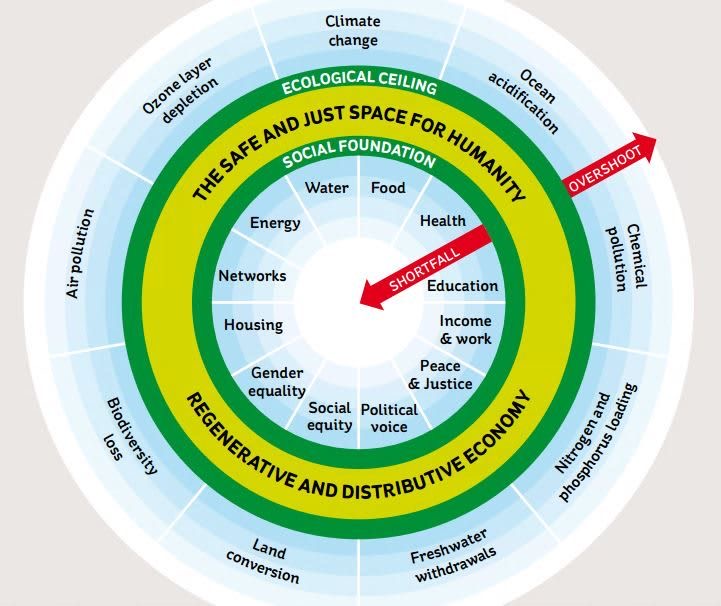
Doughnut Economics: The Economics that will not fry the economy.
The Great Depression of 1929.
Studying the economists that were able to pose world changing solutions and save economies during that time certainly captivated my interest. I always wondered what it must have been like to live through a great economic crisis, not expecting that I would have to at some point.
The Great Lockdown of 2020.
The first economic crisis in history that was started by a virus, sent oil into the negative price range, and threatened the lives of mankind in almost every single country, and the first pandemic that I am living through, in the small island of Trinidad and Tobago. What does this mean for me, a youth, who is still learning the economic fundamentals?
Seeing the effects that the virus is having on the economy is catastrophic to look at, through the lens of a budding economist. The loss of economic activity, loss of income, less international trade and food shortages are threatening to society on a whole. The impacts of the virus on the oil and gas market are appalling for an oil and gas dependent nation.
Trinidad and Tobago, being a small island developing state, has had a tight hold on managing the spread of the virus thus far, and placed several policies in place to achieve an economic recovery. However, we hold a very traditional approach in how we handle our economics, and I believe that it is time for revolutionary change. A change that will help our developing economy to flourish, and our progress to rise.
As a student who possesses a strong passion for sustainable development, I believe there is a model that should be employed by our small island developing state, moving forward.
Doughnut Economics. A model developed by English Economist, Kate Raworth. Trinidad and Tobago is in desperate need of a new economic approach. We are reaching the end of the oil and gas rope we've been pulling at for the past decades. The COVID-19 pandemic has brought economic activity to a standstill and therefore provides the opportunity for a remodeling of the traditional economics we practice.
What is Doughnut Economics? This model is serves as a framework for sustainable development . Shaped like a doughnut, integrating the concept of environmental boundaries with the complementary concept of social/developmental boundaries.The main goal of the model is to remodel economic approaches and set new goals.
The doughnut economics model seems to be an impeccable model to be adapted in our way forward. This is why:
- This economic model takes into consideration the human and environmental aspect of economic progress, and places it within the frame of traditional economics. Trinidad and Tobago is dependent on our natural endowments, i.e., human capital and the environment. Yet, our attempts to achieve economic progress in the past have relied solely on exploiting our non-renewable natural resources in an unsustainable manner, due to the Dutch Disease and the resource curse. We are currently in a position where the effects of no diversification and declining revenues are catching up to us, and threatening our economy and our people. It is time for a sustainable approach to be used to advance our economy, and following this model is the perfect route to be taken, as it is rooted in sustainability.
- The model encompasses climate action which is desperately needed by the entire world at this point. According to the United Nations Secretary General, climate change is still a bigger threat than the Coronavirus. (United Nations Climate Report 2020). By utilizing this model not only are we fighting the monster that is climate change, but we are ensuring that we achieve stability for the future generations to come, and make up for the unsustainable practices that we engaged in, in the past. This model recognizes that our environment is what our economy and mankind rely on, and in this regard, places great importance on the preservation of it.
- According to Economist Amartya Sen, people are the center of economic development. The doughnut economics model quite physically places people at the center of the model. The model focuses on improving inequalities, poverty, education, income, and other humanitarian issues that are deemed critical for progress. Trinidad and Tobago’s natural endowment is human capital and there is a growing poverty and unemployment rate during the COVID-19 pandemic which should be corrected through sustainable means post-COVID.
- The model comprises of the collaborative commons and the unpaid care economy which is a dynamic part of the modern economy. It moves away from the idea that growth and progress is measured through GDP, a straight line. Rather, it poses that economics does not begin with monetary value, but rather, human well-being.
5. The model allows us to simultaneously achieve economic progress while achieving the Sustainable Development Goals.
What about increasing GDP? By ensuring we achieve sustainable economic development, economic growth will follow as well. There is a call to work from the inside out, rather than from the outside in. Sustainable development is especially important for Trinidad and Tobago as we are experiencing the damaging effects from unsustainability, first hand.
While the doughnut Economics Model has brought some criticisms, it is still import to acknowledge its aspects.In this regard, I urge policy makers to adapt some form of the Doughnut Economics Model, because the COVID-19 pandemic is killing economic development by squeezing the life out of the very source, human capital. Once the pandemic is over, the economy will be able to breathe again but will end up a crippled body if sustainable economic approaches are not used to revive it.






